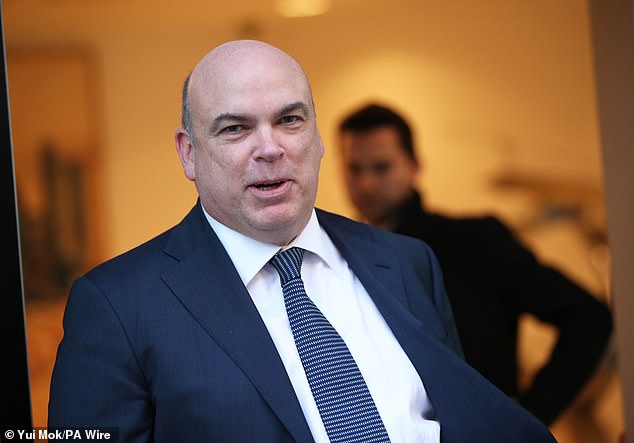Table of Contents
It is tragic to learn that Mike Lynch, one of Britain’s brightest tech entrepreneurs, and his 18-year-old daughter are still missing after their luxury superyacht was hit by a freak storm off the coast of Sicily yesterday morning.
So far, one person has been confirmed dead and four others are still missing after the Bayesian capsized after being hit by a tornado near Palermo. His wife was rescued.
Although Lynch has often been hailed as Britain’s answer to West Coast brains like Bill Gates, his genius was actually quite different and on a higher mathematical scale.
And the name of his 184ft, £30m superyacht is a testament to his vast skills.
Tragic: Tech tycoon Mike Lynch (pictured) is missing after his superyacht was hit by a freak storm off the coast of Sicily yesterday morning.
At the heart of the many pioneering and highly successful companies Lynch has founded or invested in – from Autonomy to cybersecurity firm Darktrace to software group Featurespace – is Bayesian statistics.
This is the field of statistics based on the work of 18th century mathematician Thomas Bayes, where probability expresses a degree of belief in an event.
This could be based, for example, on prior knowledge of an event (such as results of previous experiments or even personal beliefs).
It may sound complex, but it is at the root of how banks use machine learning algorithms to track fraud in your bank account or, indeed, how security services hunt down terrorists.
It was at Cambridge, while studying for his PhD in neural networks (machine learning to us), that the Essex scholar became fascinated by probability and patterns of adaptive behaviour.
It was also when he began to mix his math skills with business, creating audio products for music synthesizers and computer-based fingerprint recognition.
Then came Autonomy, one of the pioneers in analyzing enterprise data using machine learning, which made him billions when he sold it for $11 billion to Silicon Valley computing giant Hewlett Packard about 13 years ago.
The fabulous riches bestowed upon Lynch momentarily sealed his reputation as Britain’s most successful tech tycoon, placing him on a global stage with peers such as Gates and Apple’s Steve Jobs.
It was also a high point for Cambridge’s technology scene, cementing its reputation as one of the most innovative scientific clusters in the world.
However, he turned out to be Lynch’s nemesis, leading to one of the bloodiest transatlantic legal disputes.
HP sued Lynch for alleged fraud, alleging that Autonomy had overstated its revenue by more than $5 billion and seeking billions in damages.
Lynch maintained his innocence throughout, claiming that HP had “buyer’s remorse” and had failed to do due diligence.
After ten years of legal wrangling, US authorities extradited him from his home in East Anglia at dawn one morning, handcuffed and shackled him on a flight back to San Francisco, where he was held under house arrest for 13 months while his trial continued.
But less than three months ago, the businessman was acquitted of 15 fraud charges.
In a recent interview on BBC Radio 4, Lynch, 59, described his elation at being released.
‘Until you hear the words you can’t name it and at that moment it’s indescribable how you jump between two universes.
“If this had gone the wrong way, it would have been the end of life as I’ve known it in some sense.”
In another interview, when asked if the experience had been like near death, Lynch said: “That’s how I handled it. It’s strange, but you have a second life now. The question is, what do you want to do with it?”
Lynch’s horrific experience also reveals the enormous costs of the American justice system and how nearly impossible it is to fight in court without a small fortune.
As Lynch himself admitted, if he had not had the money to spend on his defence – more than £30m – he would not have stood a chance against the US judiciary.
His case once again demonstrated how ruthless the US authorities are when it comes to extraditing UK citizens.
But it seems impossible for our authorities to extradite American citizens, as demonstrated by the death of Harry Dunn, run over by a car driven by a former American spy in 2019.
It would be a fitting honour for Lynch if the UK were to tighten those treaties.
DIY INVESTMENT PLATFORMS

AJ Bell

AJ Bell
Easy investment and ready-to-use portfolios

Hargreaves Lansdown

Hargreaves Lansdown
Free investment ideas and fund trading

interactive investor

interactive investor
Flat rate investing from £4.99 per month

Saxo

Saxo
Get £200 back in trading commissions

Trade 212

Trade 212
Free treatment and no commissions per account
Affiliate links: If you purchase a product This is Money may earn a commission. These offers are chosen by our editorial team as we believe they are worth highlighting. This does not affect our editorial independence.
Some links in this article may be affiliate links. If you click on them we may earn a small commission. This helps us fund This Is Money and keep it free to use. We do not write articles to promote products. We do not allow any commercial relationships to affect our editorial independence.


